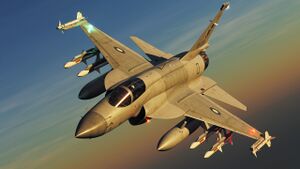SJ-1 Okami
This article is incomplete because it is pending further input from participants, or it is a work-in-progress by one author. Please comment on this article's talk page to share your input, comments and questions. Note: To contribute to this article, you may need to seek help from the author(s) of this page. |
| SJ-1 Okami | |
|---|---|

| |
| An SJ-1 of the Commonwealth Air Force | |
| Role | Multirole combat aircraft |
| National origin | |
| Manufacturer | Ryusei Rockets & Aerospace Tashihise-Nagadawa Heavy Industries Corporation Amatsukaze Concern |
| First flight | 10 April 2004 |
| Introduction | 19 August 2009 |
| Status | In production and in service |
| Primary users | Commonwealth Air Force United States Air Force United States Navy Imperial Air Force Commonwealth Air Territorial Forces |
| Produced | In Aldia: December 2008 – present In Keija: September 2009 – present In Fusou: Q1 2010 – present |
| Number built | Aldia 220 (2016) Keija 145 (2016) Fusou 150 (2016) |
The SJ-1 Okami (Myrian: 狼, Romanized: Lang / Mizuhese: 狼, lit.: "Wolf") is a fourth-generation multirole combat aircraft jointly developed by the Ryusei Rockets & Aerospace of Aldia, Tashihise-Nagadawa Heavy Industries Corporation of Keija and the Amatsuzake Concern of Fusou. It was envisioned to be a reliable, rugged, easy to manufacture and inexpensive fighter aircraft. The designation "SJ" stands for Sentōki (Mizuhese: 戦闘機, and Jiānjíjī Myrian: 歼击机), both of which means fighter aircraft in their respective languages. The "1" designation indicates it is the first international development project undertaken by the three partner countries and it may not necessarily be the last as well. The SJ-1 was previously a solo development venture by the Ryusei Rockets & Aerospace and was designated the RY-5 program. It was originally meant only as an interceptor aircraft to replace the Air Force's ageing AR-3 interceptors. However in the spirit of fostering stronger ties with its neighbor & allies, the Aldian Government decided to invite its partners to develop the fighter together. The primary purpose of the SJ-1 is to serve as a multirole fighter, however there are variants that specialize in a variety of roles such as but not limited to: reconnaicense, interceptors and ground attack variants. The Commonwealth Air Force currently has 40 SJ-1Is in active service with another 180 on order, meanwhile the Commonwealth Air Territorial Forces operates a total of 180 SJ-1s of various types with a further 60 on order.
Design & Development
Background
The SJ-1 was originally designated as the RY-5 Interceptor Program, an aircraft development project initiated by Ryusei with the objective is replacing the Air Force's ageing inventor of AR-3 interceptors. The project began in 1992 and at the time the RY-5 was meant as a third-generation aircraft, a cheap replacement. However in 1994 in an attempt to promote cooperation & regional security with its neighbors and partners decided to invite both Fusou and Keija into the new interceptor project. With the inclusion of international partners, the aircraft's mission & specification parameters were expanded in order to make it scalable and future-proofed. TBC
Operational History
Variants
Operators
Specifications
- Guns: 1 x 23 mm cannon / 1 x 30 mm cannon
Air-to-air missiles:
- RA-4 short range, infrared homing. Range 20km
- RA-8 beyond visual range, active radar guided. Range 70~100km
- RA-9 beyond visual range, active radar guided. Range 300km
Air-to-surface missiles:
- RG-12 beyond visual range, anti radiation. Range 100km
Bombs:
- BG-39 unguided bomb
- BG-41 unguided bomb (a